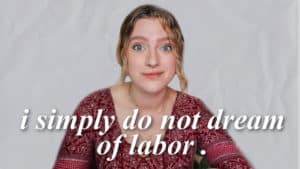Have you seen what’s trending on TikTok? In addition to squirrels, cats, and dance moves, you’ll find variations on a provocative response to the classic, ‘what’s your dream job’ question. It’s ‘I do not dream of labor’ playing out in countless videos and clever meme-inspiring ways.
Full disclosure: I’m not cool enough to have my own TikTok account. I learn much of what I need to know about pop culture through my kids. But this – unlike some of the animal and interpretive dance videos – garnered the attention of the mainstream media.
The voices, music, and imagery offer an amusing take on the nature of work and its changing role in our lives. Because so much of this content is being generated by young people, it’s tempting to overlay stereotypes and tropes related to work ethic upon this contemporary (albeit quirky) cultural conversation. And many have.
But let’s face it. This is no generational issue. Nobody – regardless of age – ‘dreams of labor.’ We don’t awaken in the morning looking forward to another day of sweating in the sun or over a keyboard, cranking out deliverables, and meeting deadlines. And any leaders who believe that are likely facing an epidemic of attrition fueled by dissatisfaction and disengagement.
This doesn’t mean, however, that we’re doomed to a workforce void of motivation, inspiration, or joy. What it does mean is that leaders must dig deeper – within themselves and their employees – to discover and tap into what people do dream of instead of labor. And to actualize those dreams within the context of work. The good news is that the workplace is an environment filled with opportunities to make this happen day-in and day-out. For instance…
- Contribution: People dream of making a difference, being of service, and aligning with a higher purpose. Work is an ideal vehicle for being able to express this common human desire in a profound way. Whether through employment with an organization that’s making the world a better place or recognizing one’s essential role in making something happen, people can realize the dream of contribution.
- Connection: Cultivating meaningful relationships, deepening networks of support, and surrounding ourselves with the experience of the community are deeply personal needs that many people dream of – and can realize through the work they choose to do.
- Challenge: Achievement, accomplishment, and recognition are at the heart of what many people find themselves dreaming of. And all of this can be found in our waking lives as we stretch beyond what’s known, step into the discomfort zone, try new and exciting things, embrace the kinds of exhilarating challenges that satisfy the soul, and serve the organization.
- Choice: Autonomy has become one of today’s most pressing workplace issues. People dream of greater control and the ability to make meaningful choices about their jobs – the how, when, and where of it. Flexibility is the dream of many. And exercising this kind of choice and decision-making fuels engagement, satisfaction, learning, and growth for the individual – not to mention retention and results for the organization.
And this is just the beginning. An employee’s experience at work can deliver on the dream of greater competence, confidence, contentment, and more. But only when leaders are committed to understanding what’s motivating, interesting, and inspiring to those with whom they work. When then cultivate a conversational cadence that allows them to connect with others – and to connect work to their dreams.
Nobody dreams of labor. But we do hold big, beautiful, bold dreams that, with intention and support, can find expression within and enhance meaning outside of the workplace.
—
Learn more about delivering on the ‘dream’ in Julie’s new book, Promotions Are So Yesterday. And discover which of these dimensions might be most interesting to you and/or your employees by taking the free online Multidimensional Career Self-Assessment.
This post originally appeared on SmartBrief.
